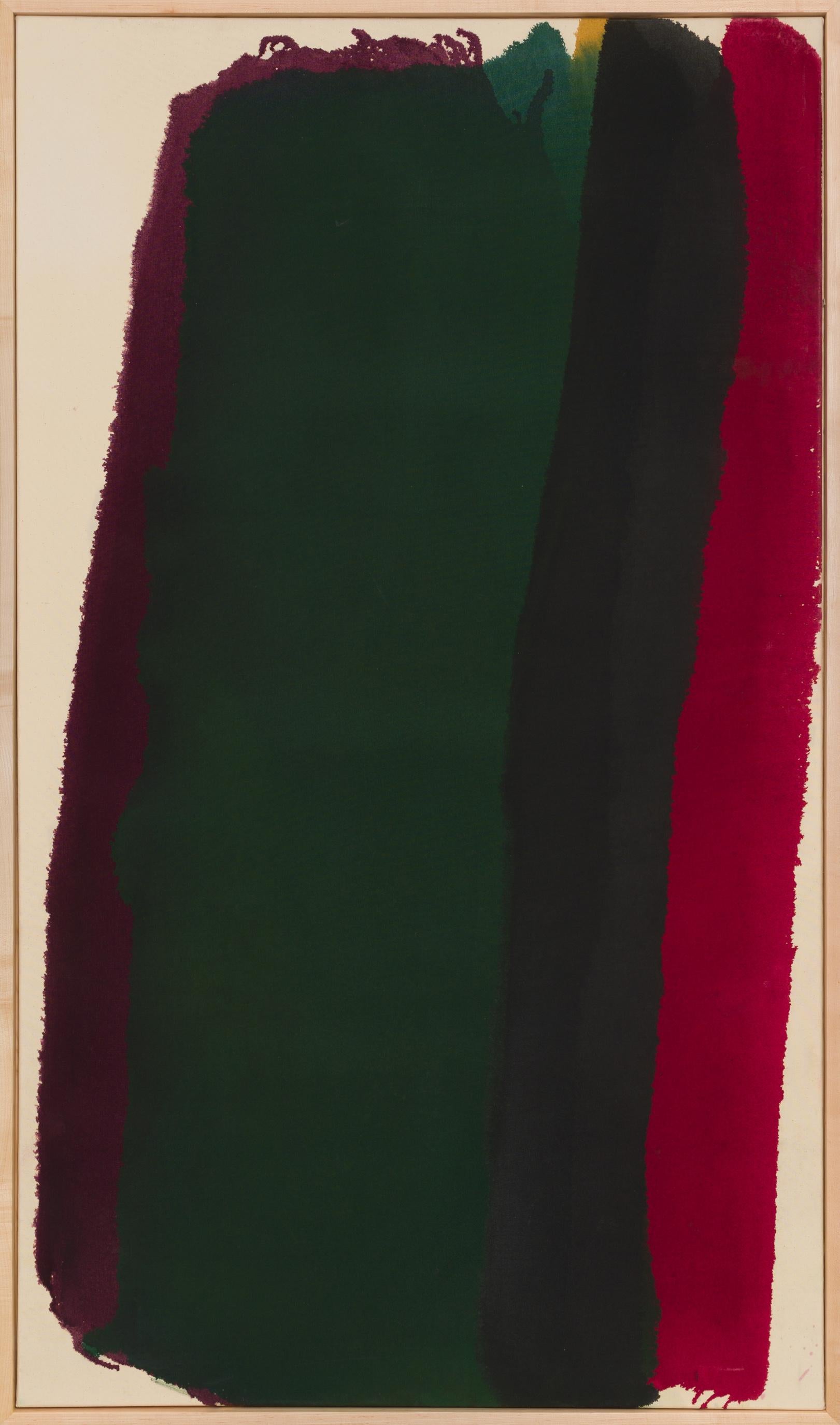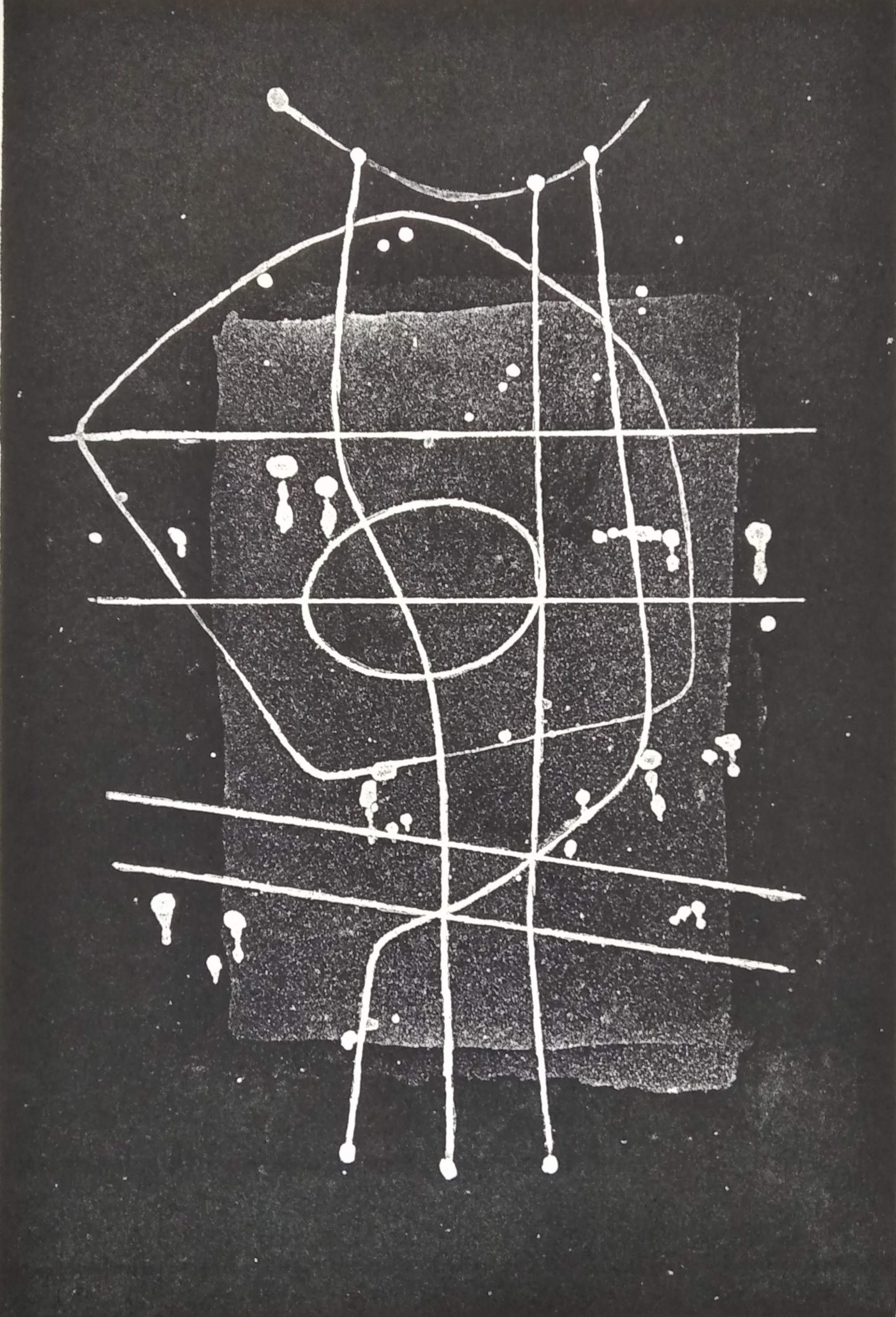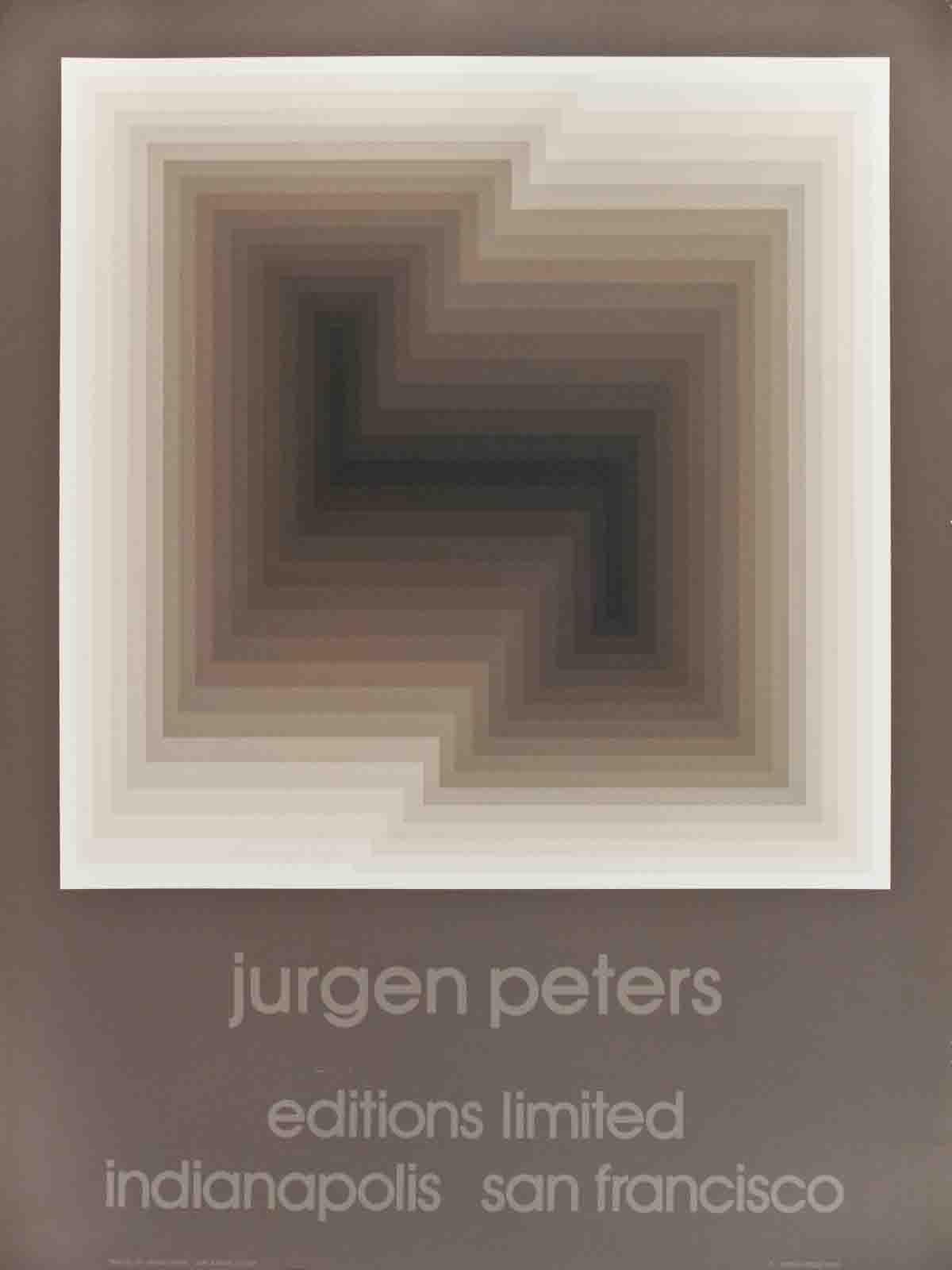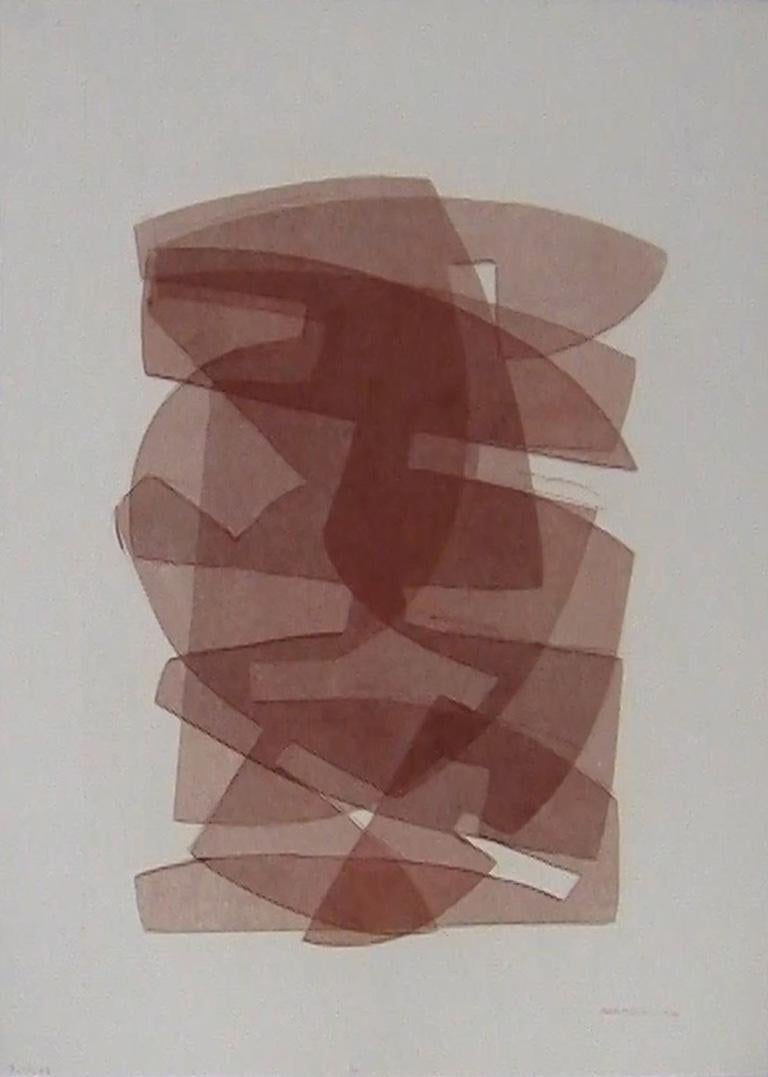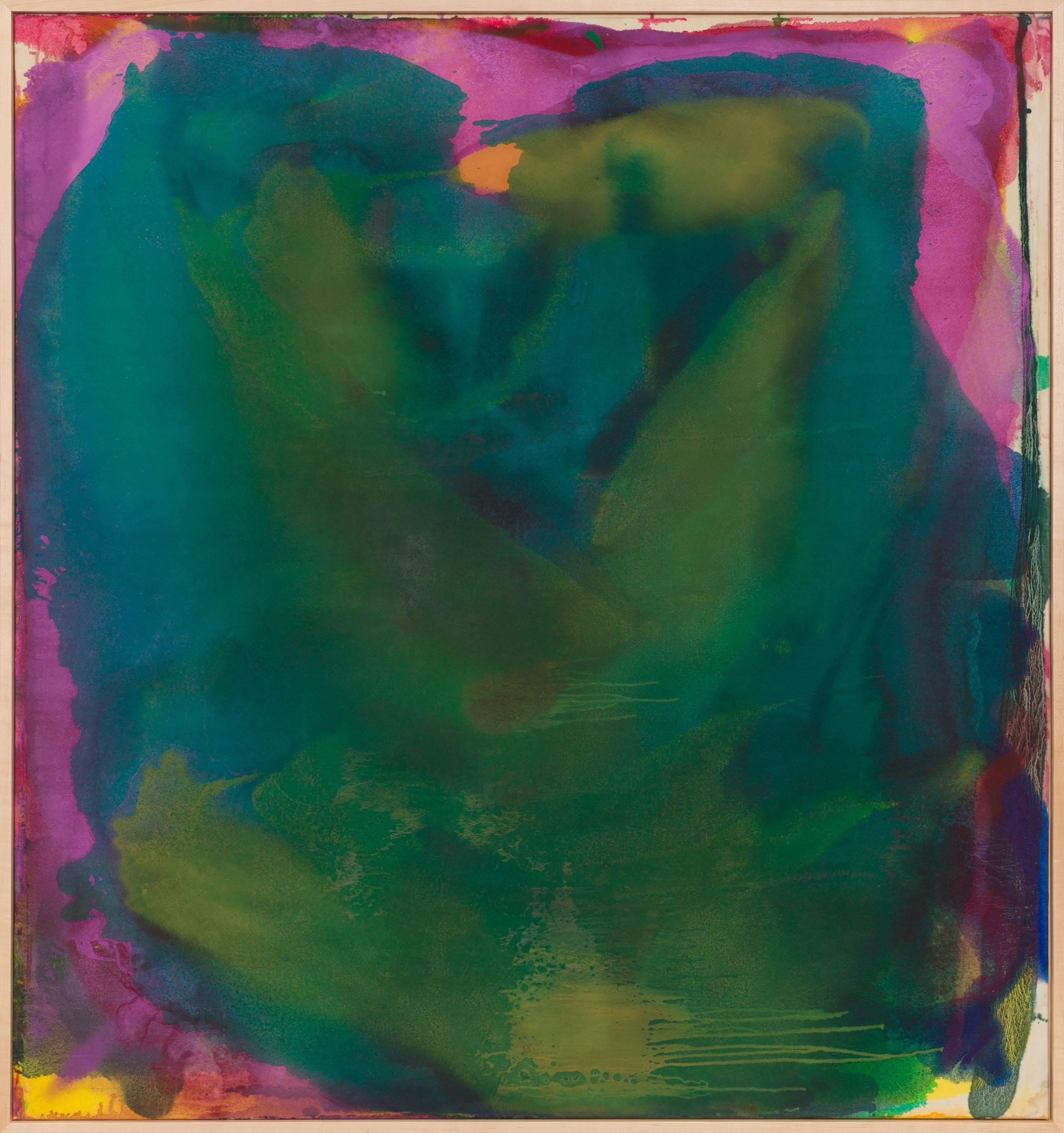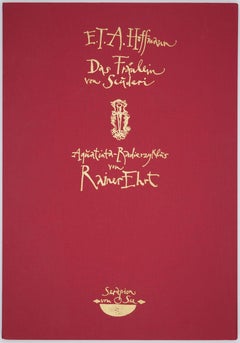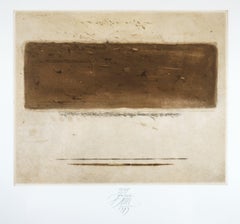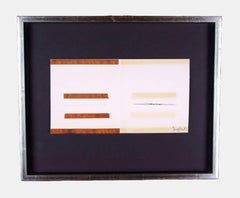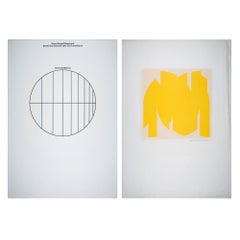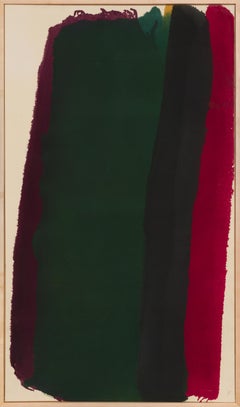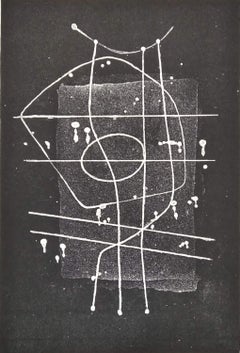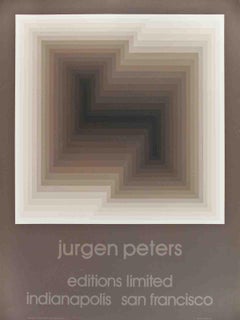Items Similar to Colors / - The Pictures of Concepts -
Want more images or videos?
Request additional images or videos from the seller
1 of 8
Heinz GappmayrColors / - The Pictures of Concepts -1993
1993
$2,239.96
£1,701.31
€1,900
CA$3,144.16
A$3,433.66
CHF 1,802.38
MX$41,183.68
NOK 22,700.05
SEK 21,324.08
DKK 14,471.39
About the Item
Heinz Gappmayr (1925 Innsbruck - 2010 ibid), Colors, 1993. Linen box with ten aquatint etchings on handmade paper and two text sheets. Published by Dorothea van der Koelen, Mainz. Copy no. 43/60. Sheet dimensions 30.2 cm (height) x 21.1 cm (width). Each etching signed, inscribed and numbered by hand.
- Cassette minimally stained and with a small rubbed area at the spine, the sheets 'blue' and 'white' somewhat browned due to age.
- The Pictures of Concepts -
The cycle "Colors" deals with the difference between the visible and the imagined. The five color plates contrast with the terms yellow, red, blue, black, and white. The colored sheets are something visible, dependent on the conditions of their materiality. The concepts conveyed by the writing, i.e. the combination of lines, are something imagined. The legibility of writing presupposes certain conventions for comprehending signs. Ideas about colors are formed through perception.
The distinction between the visible and the imagined is related to the elementary nature of the colors used here and the immateriality and comprehensiveness of the color concepts. The primary colors, like black and white, are indistinguishable. There is no exact, unambiguous correspondence between the concept and the object of perception. Red as a concept does not refer to a single red, but to all possible variations. Concepts are something independent and general.
The constitutive aspects of this series include the reduction of all colors to their irreducible components, the transformation of lineatures into something thought through writing, the presentation of individual words outside the usual syntax, and the reality of the conceptual. The visible differs from the thought, the individual from the universal.
- Heinz Gappmayr
About the artist
Heinz Gappmayr is considered the most important representative of visual poetry in the German-speaking world. Since the late 1950s, he has developed linguistic concepts as an object of visual art. Gappmayr elevated the concept to the status of a pictorial object, thus raising the question not only of the relationship between sign and signified, but above all of the pictorial nature of concepts. The concepts become "concept pictures" that have an aesthetic value of their own and yet retain their universality as signs.
Publications
zeichen. Pinguin-Verlag, Innsbruck 1962.
zeichen II. Pinguin-Verlag, Innsbruck 1964.
zeichen III. visuelle Gedichte. Edition UND im Jürgen Willing-Verlag, München 1968.
zeichen IV. visuelle Gedichte. Sema-Verlag, Karlsruhe 1970.
zahlentexte. Edition UND, München 1975.
raum. Edition UND, München 1977.
reflex. Ottenhausen Verlag, Aachen 1978.
textinstallationen. edition UND, München 1984.
raumtexte. Herbstpresse, Wien 1990.
Fläche und Raum. Museum-Galerie, Bozen 1991.
alphabet. Edition NN Oslip, Wien 1993.
modifikationen. Cantz Verlag, Ostfildern 1995.
couleurs. Jean-Pierre Huguet editeur, Le Pré Battoire 1998.
fotos. Folio Verlag, Wien-Bozen 2001.
texte 1961-1968. Ritter Verlag, Klagenfurt 2002.
texte strukturen, Galerie Lindner, Wien 2002.
Opus. Heinz Gappmayr. Gesamtverzeichnis der visuellen und theoretischen Texte 1961 -1990. Van der Koelen Verlag, Mainz 1993.
Opus. Heinz Gappmayr. Gesamtverzeichnis der visuellen und theoretischen Texte 1991 -1996. Chorus Verlag, Mainz 1997.
Opus. Heinz Gappmayr. Gesamtverzeichnis der visuellen und theoretischen Texte 1997 - 2004. Hg. Chorus Verlag, Mainz 2005.
Skizzen Entwürfe. Galerie Johann Widauer, Innsbruck 2005.
auswahl. Mit einem Nachwort von Markus Klammer. Folio Verlag, Wien-Bozen 2009.
Exhibitions
1963 Amsterdam, Stedelijk Museum, Schrift und Bild
1964 München, Barer Straße 84, Zeichen II, erste Einzelausstellung
1965 London, Institute of Contemporary Arts, Between Poetry and Painting
1966 New York, The Something Else Gallery, The Arts in Fusion
1969 Venedig, La Biennale, Mostra di poesia concreta
1970 Wien, Galerie nächst St. Stephan
1972 Bremerhaven, Kabinett für aktuelle Kunst
1982 Frankfurter Kunstverein
1985 Bern, Kunsthalle und Kunstmuseum
1988 Kassel, Neue Galerie
1989 Mainz, Galerie Dorothea van der Koelen
1991 Bozen, Museum Galerie
1991 München, Staatsgalerie moderner Kunst, Neue Pinakothek
1993 Salzburg, Rupertinum
1993 Wien, Galerie Lindner
1996 Kunsthaus Zug
1997 Kunstverein Jena
1997 Kunsthalle Wien
1997 Kunsthalle Budapest
1997 Innsbruck, Galerie Johann Widauer
2000 Innsbruck, Landesmuseum Ferdinandeum
2004 Berlin, Mies van der Rohe-Haus
2007 Rovereto, MaRT, La parola nell’arte
2008 Innsbruck, Galerie Johann Widauer
2008 Kunsthalle Wien
2010 Innsbruck, Galerie Johann Widauer
2016 Innsbruck, Galerie Johann Widauer
Works in public collections
Berlin, Staatliche Museen Preußischer Kulturbesitz, Nationalgalerie, Kupferstichkabinett, Kunstbibliothek
Bozen, Museion, Museum für moderne Kunst
Bruxelles, Musée d’Art Moderne de Bruxelles
Chemnitz, Kunstsammlungen
Dresden, Staatliche Kunstsammlungen, Kupferstichkabinett
Göppingen, Kunsthalle
Ingolstadt, Museum für konkrete Kunst
Innsbruck, Tiroler Landesmuseum Ferdinandeum
London, Victoria and Albert Museum
München, Neue Pinakothek
München, Lenbachhaus
New York, Museum of Modern Art, Library
Salzburg, Rupertinum
Stuttgart, Staatsgalerie
Wien, Albertina
Wien, Museum angewandter Kunst
Wien, Museum moderner Kunst
Würzburg, Museum im Kulturspeicher, Sammlung Peter C. Ruppert
Works in public space
Zug, Kunsthaus, ist wird, 1996
Bregenz, Rathausstraße, 0,0000000001, 1997
Graz, Universitätsbibliothek, zeit, 1997
Meran, Krankenhaus, blau hellblau weiß, 1999
Hünfeld, manche, 2001
Innsbruck, Rathaus, IST, SIND, 2002
Graz, Österreichischer Skulpturenpark, 2003
Wien, Hauptbücherei, Raumtexte, 2006
Krems, Donauuniversität, Licht-Installation, 2007
Innsbruck, Hypo-Bank, Zahlen, 2008
Innsbruck, Lodenareal, ZEIT, 2009
Bibliography
Peter Weiermair (Hrsg.): von für über. Heinz Gappmayr. Innsbruck 1985.
Dorothea van der Koelen: Das Werk Heinz Gappmayrs. Lit Verlag, Münster 1994.
Ingrid Simon, Vom Aussehen der Gedanken. Heinz Gappmayr und die konzeptuelle Kunst. Ritter Verlag, Klagenfurt 1995.
Silvia Eiblmayr (Hrsg.): Text Farbe Raum. Folio Verlag, Wien, Bozen 2001.
Siegfried J. Schmidt (Hrsg.): Zwischen Platon und Mondrian. Heinz Gappmayrs konzeptuelle Poetik. Ritter Verlag, Klagenfurt 2005.
Eugen Gomringer (Hrsg.): Konkrete Poesie: Deutschsprachige Autoren. Reclam, Stuttgart 2001.
S. D. Sauerbier: Die denkbare Fotografie des Heinz Gappmayr. In: Camera Austria. Heft 40, Graz 1992.
S. D. Sauerbier: Heinz Gappmayr – Konkretismus und Konzeptualismus in der Fotografie. In: Heinz Gappmayr. Fotos. Wien, Bozen 2001.
Wulf Herzogenrath und Dorothea van der Koelen: Dokumente unserer Zeit XXXIII: Panta Rhei. Chorus Verlag, Mainz 2005.
Dorothea van der Koelen: Erinnerungen – Heinz Gappmayr, Editionen 1988–2005. Chorus Verlag, Mainz 2015.
Markus Klammer: Im Infinitiv die Welt betrachten. Zum Werk von Heinz Gappmayr. In: Heinz Gappmayr, auswahl. Folio Verlag, Wien/Bozen 2009.
GERMAN VERSION
Heinz Gappmayr (1925 Innsbruck - 2010 ebd.), Farben, 1993. Leinenkassette mit zehn Aquatinta-Radierungen auf handgeschöpften Bütten und zwei Textblättern. Herausgegeben vom Verlag Dorothea van der Koelen in Mainz. Exemplar Nr. 43/60. Blattmaße 30,2 cm (Höhe) x 21,1 cm (Breite). Radierungen jeweils handschriftlich signiert, bezeichnet und nummeriert.
- Kassette minimal fleckig und am Rücken mit kleiner beriebener Stelle, die Blätter ‚blau‘ und ‚weiss‘ alterungsbedingt etwas braunfleckig.
- Die Bildlichkeit der Begriffe -
Der Zyklus „Farben“ thematisiert die Differenz zwischen dem Sichtbaren und dem Gedachten. Die fünf Farbblätter kontrastieren mit den Begriffen Gelb, Rot, Blau, Schwarz und Weiss. Die farbigen Blätter sind etwas Sichtbares, abhängig von den Bedingungen ihrer Materialität. Die durch die Schrift, d. h. durch Kombination von Linien vermittelten Begriffe dagegen etwas Gedachtes. Die Lesbarkeit der Schrift setzt bestimmte Konventionen des Erfassens von Zeichen voraus. Vorstellungen von Farben bilden sich durch Wahrnehmung.
Die Differenzierung zwischen Sichtbarem und Gedachtem bezieht sich auf das Elementare der hier verwendeten Farben und die Immaterialität und das Umfassende der Farbenbegriffe. Die Primärfarben sind ebenso wie Schwarz und Weiss voneinander unableitbar. Zwischen Begriff und Wahrnehmungsgegenstand gibt es keine genaue unverwechselbare Übereinstimmung. Rot als Begriff zielt nicht nur auf ein einziges Rot, sondern auf alle möglichen Varianten. Begriffe sind etwas Selbstständiges und Allgemeines.
Zu den konstitutiven Aspekten dieser Reihe gehören die Reduktion aller Farben auf ihre irreduziblen Komponenten, die Umsetzung von Lineaturen in etwas Gedachtes durch die Schrift, die Präsentation der einzelnen Wörter ausserhalb der gewohnten Syntax und die Realität des Begrifflichen. Das Sichtbare unterscheidet sich vom Gedachten, das Einzelne vom Universellen.
- Heinz Gappmayr
zum Künstler
Heinz Gappmayr gilt als wichtigster Vertreter der visuellen Poesie im deutschsprachigen Raum. Ab den späten 50er Jahren erschließt er sprachliche Begriffe als Gegenstand der bildenden Kunst. Gappmayr erhebt den Begriff zum Bildgegenstand und eröffnet damit nicht allein die Frage nach dem Verhältnis von Zeichen und Bezeichnetem, sondern vor allem nach der Bildlichkeit der Begriffe. Die Begriffe werden zu ‚Begriffsbildern‘, die einen ästhetischen Eigenwert aufweisen und dennoch ihre Allgemeingültigkeit als Zeichen bewahren.
Publikationen
zeichen. Pinguin-Verlag, Innsbruck 1962.
zeichen II. Pinguin-Verlag, Innsbruck 1964.
zeichen III. visuelle Gedichte. Edition UND im Jürgen Willing-Verlag, München 1968.
zeichen IV. visuelle Gedichte. Sema-Verlag, Karlsruhe 1970.
zahlentexte. Edition UND, München 1975.
raum. Edition UND, München 1977.
reflex. Ottenhausen Verlag, Aachen 1978.
textinstallationen. edition UND, München 1984.
raumtexte. Herbstpresse, Wien 1990.
Fläche und Raum. Museum-Galerie, Bozen 1991.
alphabet. Edition NN Oslip, Wien 1993.
modifikationen. Cantz Verlag, Ostfildern 1995.
couleurs. Jean-Pierre Huguet editeur, Le Pré Battoire 1998.
fotos. Folio Verlag, Wien-Bozen 2001.
texte 1961-1968. Ritter Verlag, Klagenfurt 2002.
texte strukturen, Galerie Lindner, Wien 2002.
Opus. Heinz Gappmayr. Gesamtverzeichnis der visuellen und theoretischen Texte 1961 -1990. Van der Koelen Verlag, Mainz 1993.
Opus. Heinz Gappmayr. Gesamtverzeichnis der visuellen und theoretischen Texte 1991 -1996. Chorus Verlag, Mainz 1997.
Opus. Heinz Gappmayr. Gesamtverzeichnis der visuellen und theoretischen Texte 1997 - 2004. Hg. Chorus Verlag, Mainz 2005.
Skizzen Entwürfe. Galerie Johann Widauer, Innsbruck 2005.
auswahl. Mit einem Nachwort von Markus Klammer. Folio Verlag, Wien-Bozen 2009.
Ausstellungen
1963 Amsterdam, Stedelijk Museum, Schrift und Bild
1964 München, Barer Straße 84, Zeichen II, erste Einzelausstellung
1965 London, Institute of Contemporary Arts, Between Poetry and Painting
1966 New York, The Something Else Gallery, The Arts in Fusion
1969 Venedig, La Biennale, Mostra di poesia concreta
1970 Wien, Galerie nächst St. Stephan
1972 Bremerhaven, Kabinett für aktuelle Kunst
1982 Frankfurter Kunstverein
1985 Bern, Kunsthalle und Kunstmuseum
1988 Kassel, Neue Galerie
1989 Mainz, Galerie Dorothea van der Koelen
1991 Bozen, Museum Galerie
1991 München, Staatsgalerie moderner Kunst, Neue Pinakothek
1993 Salzburg, Rupertinum
1993 Wien, Galerie Lindner
1996 Kunsthaus Zug
1997 Kunstverein Jena
1997 Kunsthalle Wien
1997 Kunsthalle Budapest
1997 Innsbruck, Galerie Johann Widauer
2000 Innsbruck, Landesmuseum Ferdinandeum
2004 Berlin, Mies van der Rohe-Haus
2007 Rovereto, MaRT, La parola nell’arte
2008 Innsbruck, Galerie Johann Widauer
2008 Kunsthalle Wien
2010 Innsbruck, Galerie Johann Widauer
2016 Innsbruck, Galerie Johann Widauer
Werke in öffentlichen Sammlungen
Berlin, Staatliche Museen Preußischer Kulturbesitz, Nationalgalerie, Kupferstichkabinett, Kunstbibliothek
Bozen, Museion, Museum für moderne Kunst
Bruxelles, Musée d’Art Moderne de Bruxelles
Chemnitz, Kunstsammlungen
Dresden, Staatliche Kunstsammlungen, Kupferstichkabinett
Göppingen, Kunsthalle
Ingolstadt, Museum für konkrete Kunst
Innsbruck, Tiroler Landesmuseum Ferdinandeum
London, Victoria and Albert Museum
München, Neue Pinakothek
München, Lenbachhaus
New York, Museum of Modern Art, Library
Salzburg, Rupertinum
Stuttgart, Staatsgalerie
Wien, Albertina
Wien, Museum angewandter Kunst
Wien, Museum moderner Kunst
Würzburg, Museum im Kulturspeicher, Sammlung Peter C. Ruppert
Werke im öffentlichen Raum
Zug, Kunsthaus, ist wird, 1996
Bregenz, Rathausstraße, 0,0000000001, 1997
Graz, Universitätsbibliothek, zeit, 1997
Meran, Krankenhaus, blau hellblau weiß, 1999
Hünfeld, manche, 2001
Innsbruck, Rathaus, IST, SIND, 2002
Graz, Österreichischer Skulpturenpark, 2003
Wien, Hauptbücherei, Raumtexte, 2006
Krems, Donauuniversität, Licht-Installation, 2007
Innsbruck, Hypo-Bank, Zahlen, 2008
Innsbruck, Lodenareal, ZEIT, 2009
Bibliographie
Peter Weiermair (Hrsg.): von für über. Heinz Gappmayr. Innsbruck 1985.
Dorothea van der Koelen: Das Werk Heinz Gappmayrs. Lit Verlag, Münster 1994.
Ingrid Simon, Vom Aussehen der Gedanken. Heinz Gappmayr und die konzeptuelle Kunst. Ritter Verlag, Klagenfurt 1995.
Silvia Eiblmayr (Hrsg.): Text Farbe Raum. Folio Verlag, Wien, Bozen 2001.
Siegfried J. Schmidt (Hrsg.): Zwischen Platon und Mondrian. Heinz Gappmayrs konzeptuelle Poetik. Ritter Verlag, Klagenfurt 2005.
Eugen Gomringer (Hrsg.): Konkrete Poesie: Deutschsprachige Autoren. Reclam, Stuttgart 2001.
S. D. Sauerbier: Die denkbare Fotografie des Heinz Gappmayr. In: Camera Austria. Heft 40, Graz 1992.
S. D. Sauerbier: Heinz Gappmayr – Konkretismus und Konzeptualismus in der Fotografie. In: Heinz Gappmayr. Fotos. Wien, Bozen 2001.
Wulf Herzogenrath und Dorothea van der Koelen: Dokumente unserer Zeit XXXIII: Panta Rhei. Chorus Verlag, Mainz 2005.
Dorothea van der Koelen: Erinnerungen – Heinz Gappmayr, Editionen 1988–2005. Chorus Verlag, Mainz 2015.
Markus Klammer: Im Infinitiv die Welt betrachten. Zum Werk von Heinz Gappmayr. In: Heinz Gappmayr, auswahl. Folio Verlag, Wien/Bozen 2009.
- Creator:Heinz Gappmayr (1925 - 2010, Austrian)
- Creation Year:1993
- Dimensions:Height: 11.89 in (30.2 cm)Width: 8.35 in (21.2 cm)Depth: 1.97 in (5 cm)
- Medium:
- Movement & Style:
- Period:
- Condition:
- Gallery Location:Berlin, DE
- Reference Number:1stDibs: LU2438215625642
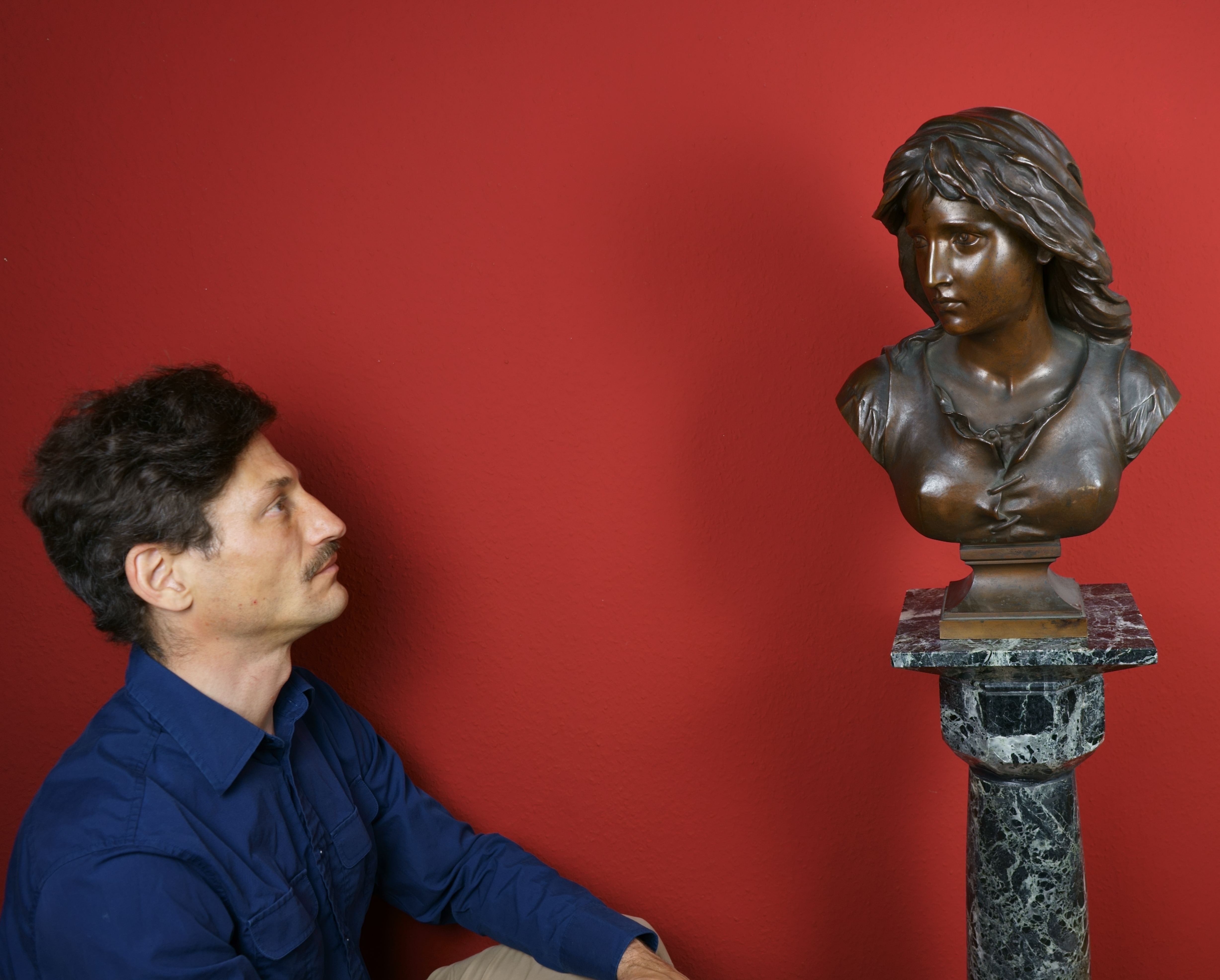
About the Seller
5.0
Vetted Professional Seller
Every seller passes strict standards for authenticity and reliability
Established in 2014
1stDibs seller since 2023
22 sales on 1stDibs
- ShippingRetrieving quote...Shipping from: Berlin, Germany
- Return Policy
Authenticity Guarantee
In the unlikely event there’s an issue with an item’s authenticity, contact us within 1 year for a full refund. DetailsMoney-Back Guarantee
If your item is not as described, is damaged in transit, or does not arrive, contact us within 7 days for a full refund. Details24-Hour Cancellation
You have a 24-hour grace period in which to reconsider your purchase, with no questions asked.Vetted Professional Sellers
Our world-class sellers must adhere to strict standards for service and quality, maintaining the integrity of our listings.Price-Match Guarantee
If you find that a seller listed the same item for a lower price elsewhere, we’ll match it.Trusted Global Delivery
Our best-in-class carrier network provides specialized shipping options worldwide, including custom delivery.More From This Seller
View AllGraphic portfolio for E. T. A. Hoffmann ‘Miss of Scuderi’, 2003
Located in Berlin, DE
Rainer Ehrt (*1960 Elbingerode), Graphic portfolio for E. T. A. Hoffmann ‘Miss of Scuderi’, 2003. Seven color aquatint etchings, 53 cm x 38 cm in linen folder, each signed in lead lo...
Category
Early 2000s Realist Figurative Prints
Materials
Paper
Field - Field research -
Located in Berlin, DE
Karl Ludwig Mordstein (1937 Füssen - 2006 Wilszhofen), Field 1983. Color etching, copy 13/65, 22.5 x 28 cm (image), 40 x 45 cm (sheet), 43 x 48 cm (frame), titled, numbered, monogram...
Category
1980s Abstract Abstract Prints
Materials
Etching
$424 Sale Price
20% Off
Collage with metal application / - Rhythm and Reflection -
Located in Berlin, DE
Hermann Goepfert (1926 Bad Nauheim - 1982 Antwerp), Collage with metal application, 1965. Contribution no. 14 from the anthology 'La lune en rodage II' published by Editions Panderma...
Category
1990s Abstract Mixed Media
Materials
Paper
Six variations on a circular theme / - The Musical Proportions of the Circle -
Located in Berlin, DE
Hans Rudolf Bosshard (*1929 Balm-Lottstetten), Six variations on a circular theme, 1967. Portfolio with inserted cover sheet and six color woodcuts on thin Japanese paper. Copy no. 6...
Category
1960s Minimalist Abstract Prints
Materials
Paper
Tectonic Tension / - Archetypes of Painting -
Located in Berlin, DE
Jürgen Möbius (*1939 Großenhain), Tectonic Tension. Oil on hardboard, 47.5 x 60 cm, 49 x 61.5 cm (frame), signed lower right "Möbius" and dated "[19]81".
- Upper left corner with a small chip, light scratches and a little rubbed in places. Provisional gallery frame with traces of use.
- Archetypes of Painting -
About the artwork
The form structure in front of the eye is overlapped by the frame. Thus, the frame does not open up a space in which something is presented, but rather shows the seemingly arbitrary section of a comprehensive context that cannot be framed as such.
We see forms that stand in a structure of tension with each other, whereby the individual black and brown forms, which continue almost endlessly beyond the frame, already show a tension in themselves, since they are not only forms, but also surfaces - form surfaces, while the light blue surface ground is at the same time forms that appear as surface forms. The formed surfaces and surface forms are nested within each other and form a structure that encompasses all elements.
The angular arrangement of the black and brown shaped surfaces gives the structure a tectonic character. The tension is thus heightened to the point of paradox, since the black shape at the front is overlapped by the brown shape at the bottom in the center of the picture, which would be impossible in real space. It is precisely through this "paradox" that Möbius demonstrates that the paradoxical is reality within painting. It is, so to speak, the most original possibility of painting, which distinguishes it from the other arts. In combination with the tectonic formations, Jürgen Möbius creates an archaic primordial painting, which, however, should not be confused with the autonomous color and form cosmos of Suprematism à la Kasimir Malevich. Instead of homogeneous, perfectly colored forms, here the colors are deliberately applied unevenly, and the light blue is mixed with the brown in a manner determined by the brushstroke. At the edges of the surface forms, the uneven application of paint allows the wood of the unprimed hardboard to show through. In this way, Möbius illustrates that we are dealing with a painting that has been created by an act of painting - an act, however, that takes hold of the original principles of painting and thus realizes painting as such.
About the artist
From 1959 to 1965 Jürgen Möbius studied painting at the University Institute for Art and Work Education in Mainz. He also studied philosophy and art history at the University of Mainz. Afterwards he worked as a freelance artist in Mainz.
At first, Möbius created material reliefs and installations, then, around 1974, he turned increasingly to conceptual art and added cinematic means. During this phase he wrote the manifesto-like essay "Principles of Supranatural Landscape" (1979).
From 1981 on, Möbius concentrated on painting and searched for artistic ways to "treat intellectual and sensual perception equally in the fusion of representational and abstract pictorial elements" (Wolfgang Zemter). He found inspiration on his study trips to Thailand and Sri Lanka.
"The pure painting of Jürgen Möbius flows through us as a timeless expression of memory and energy, ploughing our perception and bringing us the happiness of seeing authentic, immovable form.
- Philippe Büttner
Selection of solo exhibitions
1969 Galerie Würzner, Düsseldorf / Galerie Gurlitt, Mainz
1972 Städtische Galerie, Mainz
1973 Galerie Schloss Ringenberg Rathaus, Kleve
1974 Röderhausmuseum, Wuppertal
1976 Galerie Glasing, Osnabrück / Städtische Galerie, Herne
1977, 1997, 2004 Märkisches Museum, Witten
1979 Studio M, Bamberg / Staatstheater, Darmstadt
1980 Galerie Stolànovà, Wiesbaden / Mittelrheinmuseum, Koblenz
1982 Galerie Dornhöfer, Mainz
1984 Galerie Neumühle, Schlangenbad
1985 Landesmuseum, Mainz / Kunstverein, Ludwigshafen / Nassauischer Kunstverein, Wiesbaden
1986 Museum, Bochum / Galerie der Stadt Iserlohn
1987, 1990 Galerie Klaus Kiefer, Essen
1987, 2000 Galerie Ulrike Buschlinger, Wiesbaden
1988 Kunsthalle Darmstadt
1988, 1992, 1996, 1999 Galerie Leonhard, Basel
1992, 2002 Galerie Zulauf, Freisheim
1994 Galerie Remy, Vallendar
1995 Sendezentrum des Zweiten Deutschen Fernsehens, Mainz
2001 Collegium oecumenicum, Bamberg / MVB Forum für Kultur und Wirtschaft, Mainz
2006 Adam Gallery, London
Selection of group exhibitions
1969 ‘International Graphic Arts’, Galerie Dalléas Bordeaux, Paris
1975 ‘Deutscher Künstler-Bund’, Dortmund
1979 ‘Man and man’s Images’, Märkisches Museum Witten
1980 ‘Love-Dokuments of our Time’, Art Hall Darmstadt and Art Association Hannover
1982 ‘Work - Progress – Position’, Nassau Art Association Wiesbaden
1983 ‘Principle Hope – Utopic Aspects in Art and Culture of the 20th Century’, Museum Bochum
1986 ‘Selfportraits’, Gallery Klaus Kiefer Essen
1987 ‘The Dying and Death’, Gallery Klaus Kiefer Essen
1989 ‘Where are You, Revolution – Freedom, Liberty, Egality, Fraternity to-day’, Museum Bochum 1990 ‘Flight – a Problem within the Memory of Man’, Kunsthalle Darmstadt ‘Art and War 1939 – 89’, House of Cultures Berlin
1991 ‘Material and Form’, Pillnitz Castle Dresden and Pfalz Gallery Kaiserslautern
1995 20 Years Exhibitions, Chrämerhuus Langenthal, Schweiz
1998 ‘Works on Paper’, Klaus Kiefer Gallery Essen
2000 ‘Acquisitions 1900 – 2000’, Mittelrhein-Museum Koblenz
2001 ‘Strange Pictures’, Klaus Kiefer Gallery Essen
2002 ‘10 Years Buschlinger Gallery’, Buschlinger Gallery Wiesbaden
2004 ‘Eternal Space – Pictures and Sculptures’, Dome of Bamberg
2005 Art Fair Chicago, Adam Gallery, London
Selected Bibliography
Mittelrheinisches Landesmuseum (Hrsg.): Jürgen Möbius - Neue Bilder, Mainz 1985.
Kunstverein Darmstadt (Hrsg.): Jürgen Möbius. Bilder 1985 - 1988. Kunsthalle Darmstadt, 26. Juni - 14. August 1988. Red. Dorit Marhenke, Lyrik Marcus Schiltenwolf, Düsseldorf 1988.
Gabriele Prusko (Hrsg.): Jürgen Möbius. Mit Texten von Philippe Büttner und Ralph Mieritz, Basel 1992.
Wolfgang Zemter (Hrsg.): Jürgen Möbius - Aktuelle Arbeiten. Märkisches Museum der Stadt Witten, Bönen 1999.
Wolfgang Zemter (Hrsg.): Jürgen Möbius. Flieger in meinem Zimmer und Beruhigte Zone, Bönen 2004.
Dama Gallery...
Category
1980s Abstract Abstract Paintings
Materials
Oil
$1,320 Sale Price
20% Off
Indistinct Clear - Fluctuating ambivalence -
Located in Berlin, DE
Karl Ludwig Mordstein (1937 Füssen - 2006 Wilszhofen), Undeutlicher deutlich, 1982. Color etching, e.a. (Epreuve d'artiste) 4/9, 22.5 x 28 cm (image), 40 x 45 cm (sheet), 43 x 48 cm ...
Category
1980s Abstract Abstract Prints
Materials
Etching
$452 Sale Price
20% Off
You May Also Like
Untitled
Located in Austin, TX
Oil on linen. Estate stamp verso. Unsigned.
71.25 x 40.5 in.
72.75 x 42 in. (framed)
Custom framed in a solid maple floater with a polyurethane clear coat finish.
Provenance
Estat...
Category
1970s Abstract Abstract Paintings
Materials
Canvas, Oil, Raw Linen
Untitled
Located in Austin, TX
Oil on linen. Unsigned.
58.25 x 46.75 in.
59.75 x 48 in. (framed)
Custom framed in a solid maple floater with a polyurethane clear coat finish.
Provenance
Estate of Gottfried Mair...
Category
1970s Abstract Abstract Paintings
Materials
Canvas, Raw Linen, Oil
Untitled
By Will Faber
Located in Barcelona, BARCELONA
The painting is being offered with a work and authenticity certificate
Category
1970s Abstract Abstract Prints
Materials
Lithograph
1979 'Diagonal'
By Jurgen Peters
Located in Brooklyn, NY
This hand-printed screen print, titled Diagonal, was created by Jurgen Peters in 1979. Published by Editions Limited and printed on-site at the gallery in San Francisco on thick art ...
Category
1970s Contemporary Prints and Multiples
Materials
Screen
$320 Sale Price
54% Off
Estate No. 082050
By Otto Neumann
Located in New Orleans, LA
Otto Neumann (1895-1975) was a German Expressionist painter and printmaker. His monotypes evolved from sharp, angular, black and whites to late abstract prints in a variety of colors. Neumann lived through revolutionary changes in the art world of prewar and postwar Germany. He was a prolific artist in Germany during a time of the country’s unprecedented academic and intellectual growth. His early work shows the influence of both French masters like Cezanne and the contemporary style that was then being developed by German Expressionists like Kirchner. A master printmaker, Neumann was also inspired by the works of Albrecht Durer, whose allegorical subject-matter and unmatched drawing technique Neumann would emulate throughout his career. A lifetime preoccupation with the human figure informs his work, with frieze-like human figures recalling ancient Greek art...
Category
1960s Expressionist Abstract Prints
Materials
Monotype
Untitled
Located in Austin, TX
Waterline Fine Art, Austin, TX is pleased to present the following work:
Oil on canvas.
63 x 59 in.
64.5 x 60.5 in. (framed)
Custom framed in a s...
Category
Early 2000s Abstract Abstract Paintings
Materials
Canvas, Oil
More Ways To Browse
Vintage Cassette
J Schmidt
Nicole Schaap
Nova Totius Terrarum Orbis Geographica Ac Hydrographica Tabula
Nova Totius Terrarum Orbis Tabula
Okura Porcelain
Otto Rudolf Schatz
Pedro Nunes
Peter Max Taylor Swift Poster
Peter Shire Menorah
Rachel Sard
Raphy Sarkissian
Richard Musgrave Evans
Richard Zinon
Ritzi Jacobi
Rodeo Chaps
S Hotchkiss
Santa Clara Pueblo Pottery
